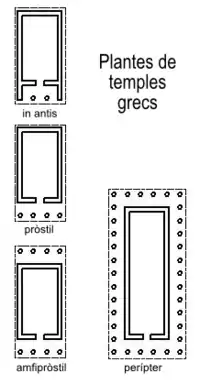Antae temple
An antae temple, also a distyle in antis temple, is a special name given to a type of ancient Greek or Roman temple that has side walls that extend to form a porch at the front or rear (or both) and terminated in structural pillars that were called the antae.[1] If columns were placed in advance of the walls or antae, the temple was termed prostyle and if columns surrounded the temple it was termed peripteral.[1][2]

Antae, Prostylos, Amphi-prostylos and Peripteral temple layouts
See also
References
- Henry Ellis (sir); British museum dept. of Gr. and Rom. antiq (1833). The British museum. Elgin and Phigaleian marbles (by Sir. H. Ellis). Charles Knight. pp. 72–. Retrieved 25 October 2012.
- Taylor, G. (1971). The Roman temples of Lebanon: a pictorial guide. Les temples romains au Liban; guide illustré. Dar el-Machreq Publishers. Retrieved 25 October 2012.
This article is issued from Wikipedia. The text is licensed under Creative Commons - Attribution - Sharealike. Additional terms may apply for the media files.